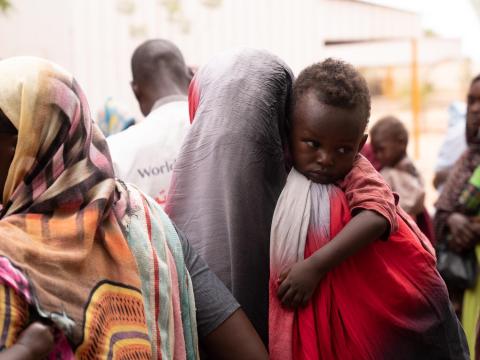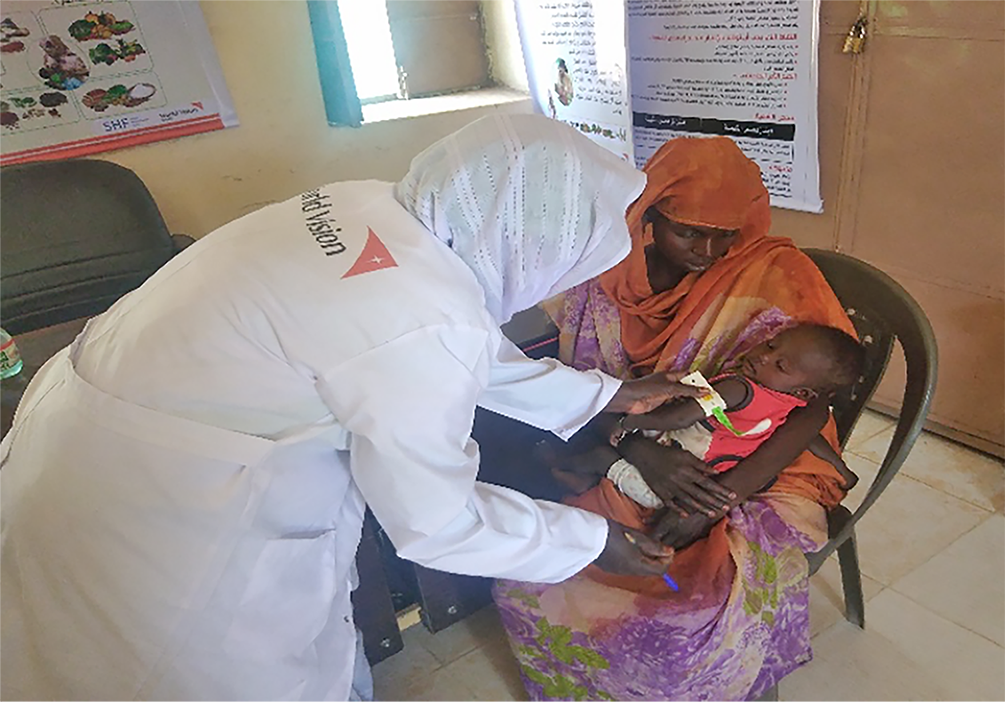As conflict pushes thousands into displacement camps, World Vision is providing health and nutrition support to the most vulnerable

In October 2022, armed conflict flared up in Sudan’s Blue Nile state leaving thousands displaced as they fled their homes. Those displaced moved into the existing Internally Displaced People (IDP) camps in different parts of the region set up by the Sudan Government, in collaboration with UN agencies and International Non-Governmental Organisations (INGOS).
In the camps, they confront serious challenges including lack of access to medical services, poor water, sanitation and hygiene (WASH) services, lack of livelihood activities and children can no longer go to school.
In one of these IDP camps, situated in Rosaries locality, over 4,000 people have been resettled. This recent influx of IDPs has further worsened the humanitarian situation in the camps.
To address the deterioration of the health situation in the Rosaries camp, World Vision with funding from the Sudan Humanitarian Fund (SHF), installed a primary health care facility at Aisha Basic School in collaboration with the State Ministry of Health (SMOH) to support over 900 IDPs based in the school.
With 10 medical staff seconded from SMOH, the facility started to receive patients in January 2023 and provides free consultations, essential medications, and laboratory services to patients from the camp.
One of the seconded staff in the clinic is a nutrition specialist supported by World Vision to improve the nutritional situation of those in the camp particularly children, and pregnant and lactating mothers.
According to the nutrition specialist, Najat, most of the displaced children visiting the clinic are suffering from malnutrition.
“With displacement, many families don’t have much to eat which leads to cases of acute malnutrition,” states Najat.
After fleeing her home in Wad Elmahi, 32-year-old Alnakheel’s 17-month-old daughter, Aisha fell ill. “I had nothing to feed my children, and my daughter got very sick,” recounts Alnakheel.
At the camp, Alnakheel was fortunate to find the World Vision supported clinic where she took Aisha for treatment.

“Aisha was very sick when she was brought to the clinic. She was drowsy and barely interested in anything around her. We provided ready to use therapeutic food to treat the malnutrition and there has been a lot of improvement,” says Najat.
Aisha is being monitored frequently by Najat and a team of community health volunteers who screen for malnutrition in the camp and counsel mothers on nutritious meals to feed their children.
According to Fatima, a medical assistant at the facility, approximately 60 people visit the clinic daily. She says:
With over 900 IDPs in this camp, there are serious hygiene and sanitation challenges. We not only treat people here at the clinic but also create awareness on basic hygiene to reduce the spread of infections among people.
Thirty-four-year-old Ard was suffering from fever and recurrent headaches. She was tested at the laboratory, diagnosed with malaria and given medication.
“I do not have much money to go to hospital. If this health centre was not here, I do not know what I’d have done,” says Ard. “I feel very fortunate to have this centre so close that I don’t need to use public transport to reach it.”
Al Naeim Numan, the Sheikh of a group of IDPs from the camp, acknowledges that the humanitarian needs in the camp are increasing and he is grateful for the support they’ve received from World Vision and other organisations that has contributed to alleviating some of the challenges they face.
- Article by Gamal Ghalab, World Vision Sudan Communications Officer.